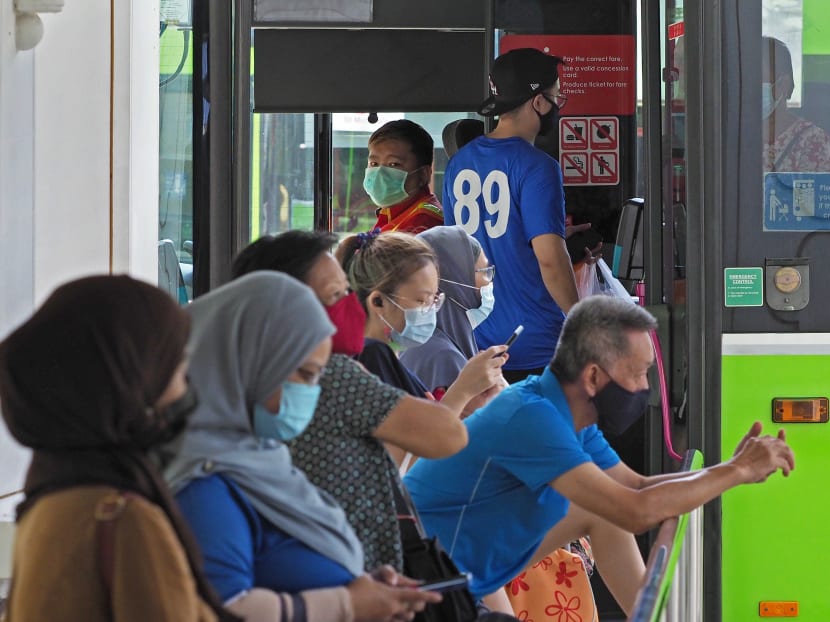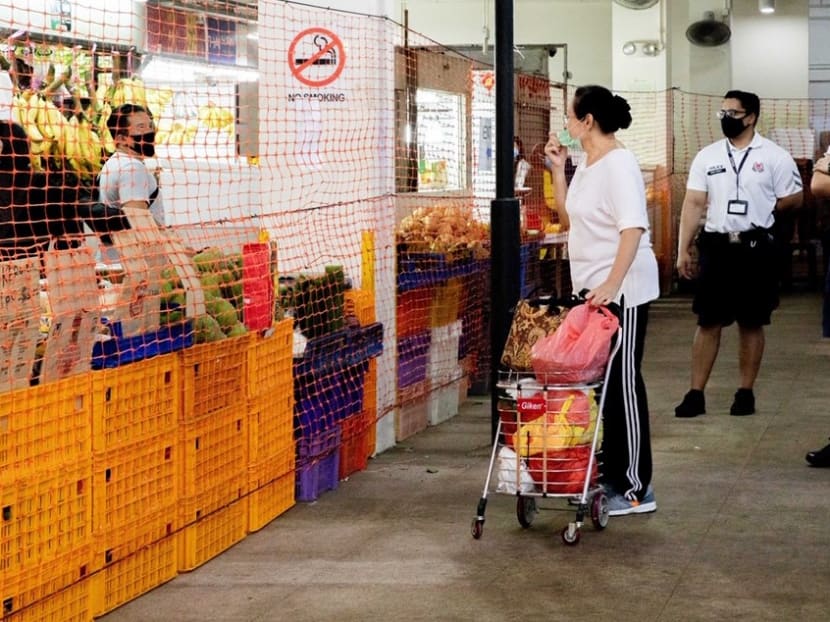Why responsibility must come before freedom in Singapore’s fight against Covid-19
A BBC writer recently commented that in Singapore the law does not prize personal freedom over collective responsibility. This is correct. We make no apologies for it.

Commuters wearing masks at Pasir Ris bus interchange on April 16. The author notes that as asymptomatic carriers of Covid-19 can still be infectious, the wearing of masks is to protect others, not the wearer.
A BBC writer recently commented that in Singapore the law does not prize personal freedom over collective responsibility. This is correct. We make no apologies for it.
The Covid-19 outbreak has thrown into stark relief the difference between societies which prize freedom and those which emphasise responsibility.
Two preliminary points: First, every moral code we have is based on responsibility, not rights. It is “do unto others as you would have them do to you”, not “everyone has a right to be treated well”.
No one with a moral sense is ever truly free to do as he likes. One has always to be conscious about how one’s behaviour impacts others.
Secondly, Singapore is the most crowded country that has ever existed in the history of humanity.
There are 5.7 million of us crammed on this island, a density of almost 8,000 per sq km. Singaporeans, unlike citizens of other crowded mini-countries such as Monaco, do not have the choice of escaping the madding crowd by living in surrounding countries.
When people have a whole continent to sprawl over, freedom is a seductive ideal. Unfortunately, in the 21st century we have run up against the limits that this planet can support. One world is not enough if we do not exercise self-restraint.
That Planet Earth is indeed one world has been graphically demonstrated by the spread of Covid-19. What started as a localised problem in a city most people had not heard of has become everybody’s problem.
The latest scientific consensus is that to contain the disease people should stay home and avoid unnecessary contact with others. This runs counter to the instincts of those who feel that they should be free to do whatever they want, whenever they want.
In Berlin, demonstrators chanted the slogan “we are the people”, suggesting that they, the sovereign people, don’t have to obey state-imposed restrictions. In America, gun-toting activists want to “liberate” their states from governmental interference with personal liberties.
The wearing of masks illustrates the gulf between responsibility and freedom.
Regular visitors to Japan would have noticed that wearing face-masks in public was common. They were a public display of social conscience to prevent the spread of coughs and colds.
At the beginning of the outbreak, the World Health Organization and the Singapore Government advised people not to wear masks if they were well, to preserve supplies for those who needed them more.
Responsible people declined to take the free masks offered, returning them to the national stockpile for the use of frontline medical personnel.
Yet some still insisted on wearing masks, not because they worried about passing the virus on, but rather because they feared getting infected themselves.
One even consulted a doctor complaining of ear-ache. He diagnosed her problem: She was wearing three masks, which were constricting her ears.
Now the rule is that masks are to be worn everywhere. Given our current knowledge that asymptomatic carriers can still be infectious, the wearing of masks is to protect others, not the wearer. Most people will heed this, but not all.
My experience moving the Maintenance of Parents Act taught me one thing: The vast majority of people are responsible and can be counted on to do the right thing, but there is always a recalcitrant minority who need to be compelled by law.
Coming back to Covid-19, this is why prosecutions are necessary to enforce compliance with the current restrictions.
Some may complain that imprisonment for breaking Stay Home Notices (SHNs) is an over-reaction. It would be unnecessary if people could be counted on to behave responsibly even without compulsion.
Unfortunately, this is not the case. It has since been discovered that some of those who had been given a SHN went out anyway.
The restrictions — SHNs, wearing of masks, physical distancing — are meant to protect everyone.
Even if the vast majority act responsibly and comply, it takes only one irresponsible super-spreader exercising his proclaimed right to freedom to unleash a new wave of infections.
Everyone’s prior sacrifices will have been in vain when a new lockdown is imposed to curb the fresh spread.
There have to be consequences for anti-social acts that threaten the collective well-being.
In the context of Covid-19, the sentences meted out by the courts serve two purposes.
First, deterrence; the punishment must be severe enough so that others are not tempted to do the same.
Secondly, and more importantly, denunciation; a signal must be sent that whatever the attitude of other libertarian societies may be, in Singapore such social irresponsibility is not acceptable.
Laws do not depend for their force on fear of consequences. There are not enough police in the world to ensure compliance by compulsion.
Societal norms are more important. The power of societal displeasure constrains anti-social acts.

Police officers asking a woman who could not enter Geylang Serai market on April 24 — her identity card number did not end with an even number, as was required that day — not to try to buy groceries through the barriers. Photo: Ili Nadhirah Mansor/TODAY
Those who have been infected with libertarian values will resent that their freedom has been restricted.
Some people in other countries visit beaches emptied by the lockdown. When confronted, they indignantly proclaim that they are not doing any harm since no one is around.
The reality is that they are taking advantage of other people’s sense of responsibility to indulge their selfish irresponsibility.
A clear signal must be sent that society will not tolerate selfishness masquerading as freedom. The welfare of the many outweighs the rights of an individual.
There will be schadenfreude (a German word meaning to take pleasure from the misfortune of others) among some libertarians that the restrictions have not prevented a resurgence of Covid-19 in Singapore, pointing to the 28,000 confirmed cases as of May 17.
I have two observations.
First, international comparisons based on confirmed cases are misleading. The way to keep confirmed cases low is not to test and not to report.
Singapore’s numbers are high because so much testing is being done. Other countries probably have not been so assiduous in testing non-symptomatic persons.
Secondly, what really counts is the death rate, that is, the number of deaths divided by the total number of infected persons.
The death-rate gives an idea of how bad the situation really is. As of May 17, there have been 22 deaths in Singapore, a death rate of 0.08 per cent.
South Korea’s death rate (according to the Coronavirus Resource Centre at Johns Hopkins University) is 2.38 per cent. Hong Kong’s is 0.38 per cent.
Contrast the death rates in three countries which host significant Singaporean expatriate populations: the United States at 6.02 per cent, the United Kingdom at 14.17 per cent and Australia at 1.4 per cent.
There are many possible reasons why Singapore’s death rate is so low.
First, that the number of deaths is under reported.
This is unlikely, since the crematoriums would have been working overtime if there had been a hidden spike. Anyway, even if we multiply deaths by a factor of 10, the death rate would still be only 0.8 per cent.
The second possibility is that the virus in Singapore is unusually benign. This may be dismissed, since there is no reason to believe that we have a divine dispensation from plagues.
Thirdly, perhaps our health system is so much better than everybody else’s. Only the most arrogantly nationalistic would believe this.
This leaves a fourth possibility: That other countries are not reporting the correct number of Covid-19 cases.
International comparisons based on flawed numbers of confirmed cases are ammunition for political games.
Politicians facing irate voters use the “confirmed” figures to demonstrate how much better they are doing than other countries. But these inaccurate comparisons are more serious than just a matter of political one-upmanship.
When international travel becomes permissible again, Singaporeans will go back to their universities and workplaces abroad.
If these countries have hidden infections, there is a risk that returning Singaporeans and visitors from those countries will spark another outbreak.
Remember that until the beginning of March the spread of the virus here was contained; the big spike was caused by imported cases and people who ignored their SHNs.
Using the Korean death rate as typical, Australia appears to have gotten the numbers right.
Applied to the US, however, a 2.38 per cent death-rate implies 3.76 million infected persons; 2.28 million more undetected cases still circulating.
The UK is equally worrying: 1.46 million cases, more than a million over the reported number.
Everyone yearns to be free of the restrictions that the pandemic imposes on normal life. Some politicians are determined to ease those restrictions, against the advice of medical professionals, saying that they are willing to take the risk (generally to improve their political standing).
That risk-taking will be paid for in deaths.
Some may say that freedom is worth it, and that it is only some old geezers who will pop off. If that is their national consensus, then good luck to them. Just don’t export deaths to others.
In a crowded country like Singapore, responsibility trumps freedom.
Some restrictions on personal freedom are here to stay until Covid-19 is beaten.
The next time your nose itches under the mask, remember: Do it not for yourself, but for your family, your friends, your neighbours and the legions of strangers who would thank you for doing the right thing to keep them safe.
ABOUT THE AUTHOR:
Professor Walter Woon is David Marshall Professor of Law at the National University of Singapore. He was formerly Singapore’s Attorney-General and a Nominated Member of Parliament.






